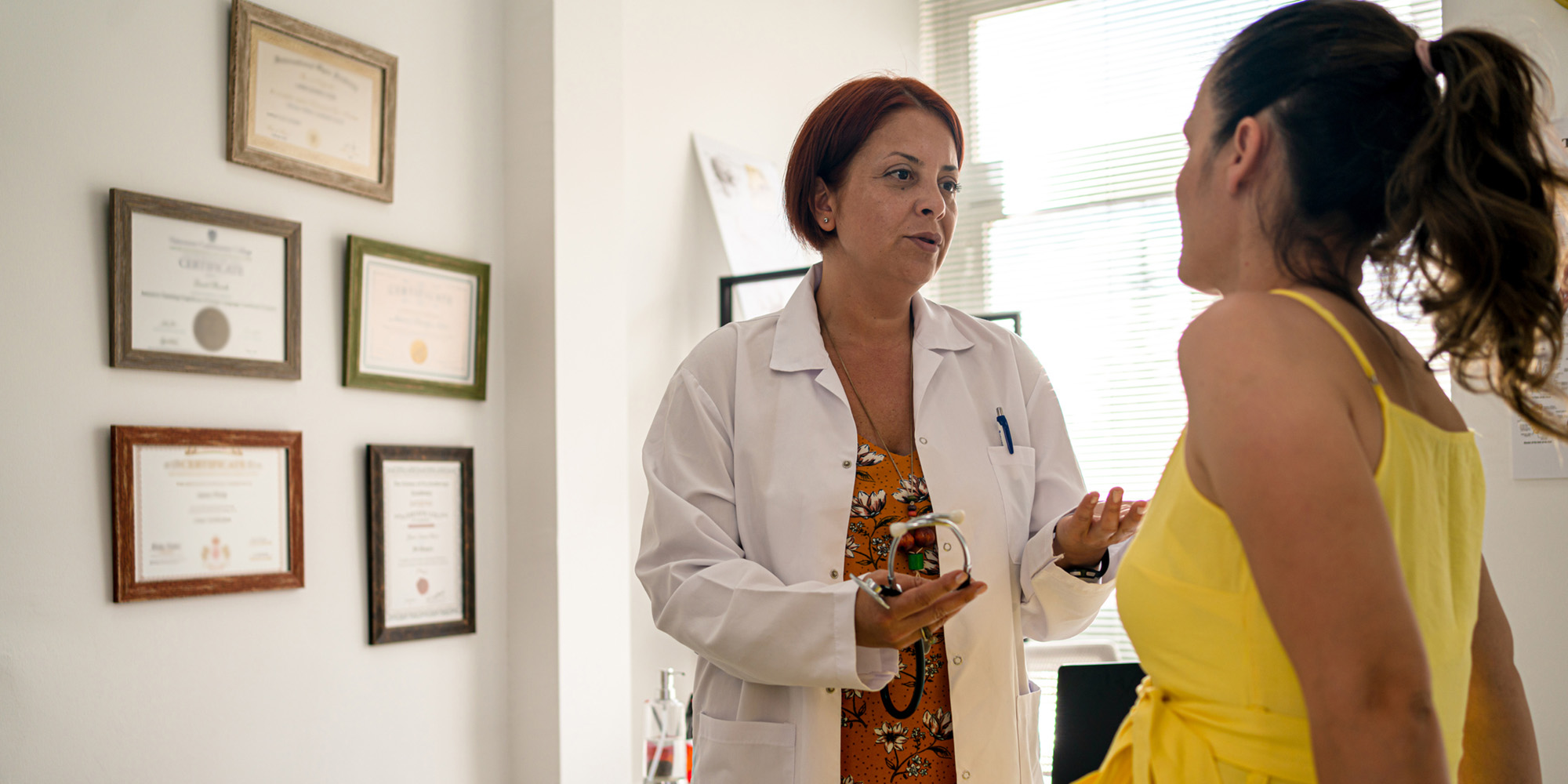What to Consider When Starting a Family
March 9, 2023
Categories: Obstetrics & Gynecology, Women's Health
Tags: pregnancy

Having a baby is a lifelong commitment. As with any major life change, you’ll want to plan ahead. Pregnancy planning involves optimizing your health and ensuring you have the right support and resources in place before you become pregnant.
“Pregnancy can be an emotional and stressful time for some people,” says Loyola Medicine OB/GYN Elizabeth Paganessi, MD. “Planning can help minimize stress and ease the transition into parenthood.”
Pregnancy planning checklist
There are many factors to think about before starting a family. A pregnancy planning list helps ensure you’ve done everything you can to have a healthy pregnancy and baby, says Dr. Paganessi.
Consider the following suggestions to make sure you’re ready to become pregnant:
Eat healthy and exercise
Eating healthy foods and exercising regularly are essential before becoming pregnant. A healthy diet is rich in whole grains, lean proteins, fruits and vegetables and low in processed foods and simple sugars.
“If someone could benefit from weight loss, we may recommend a low-calorie diet,” says Dr. Paganessi. “Studies show that a healthy weight is safest for pregnancy. If you need help, a nutritionist can advise you on how to cut calories without losing essential nutrients.”
Exercise can also help you achieve a healthy weight. Most doctors don’t recommend starting an exercise regimen during pregnancy. But if you exercise before you become pregnant, you can usually continue into pregnancy. Low-impact activities such as walking, swimming and yoga are ideal.
Control chronic health conditions
In most cases, a chronic health condition shouldn’t prevent you from having a baby. Effective disease management with the help of your doctor is key.
Some common conditions that can impact pregnancy include:
- Autoimmune diseases
- Diabetes
- High blood pressure
- Thyroid conditions
If you have a chronic condition, your OB/GYN will coordinate with your medical specialist to make sure it is under control. You may also see a maternal-fetal medicine physician who has expertise in overseeing complicated pregnancies. “We use a team approach to provide optimal care and keep a close eye on you and your baby’s health,” says Dr. Paganessi.
Chronic conditions often require prescription medications. Ask your doctor if your medications are safe to take while pregnant. You may need a different dose or type.
Take a daily prenatal vitamin
Prenatal vitamins provide the essential nutrients developing babies need. An important component of prenatal vitamins is folic acid, which prevents neural tube defects of the brain and spine, such as spina bifida.
Neural tube defects occur very early in pregnancy, before most women know they’re pregnant, says Dr. Paganessi. The recommendation for folic acid is 0.4 g (400 mg) per day before and during pregnancy. Your doctor may recommend a higher dose if you have a history if neural tube defects.
Time when you stop birth control
After stopping some birth control methods, you may not release an egg (ovulate) right away. For example, after removing an intrauterine device (IUD) or implant, it may take several months to ovulate. With birth control pills, ovulation usually occurs sooner — sometimes the first cycle after stopping.
Some women switch from a long-acting contraceptive to pills when considering pregnancy, says Dr. Paganessi. This change gives them more control over when they can first start trying to become pregnant.
Know your family history
If a health condition runs in your family, there’s a chance you could pass it to your child. Many diseases, such as Down syndrome, cystic fibrosis and some types of cancer can be inherited.
A genetic counselor can assess your family tree and test you for specific genetic abnormalities. They can also help you understand the risk level of having a child with that condition.
Avoid toxic substances
Most women know that tobacco, alcohol and drug use during pregnancy can harm the baby. There are also certain foods you should avoid, such as:
- Cold deli meat (deli meat is okay if you heat it)
- Raw fish and shellfish
- Seafood high in mercury (such as swordfish, king mackerel and orange roughy)
- Too much caffeine (over 200 mg per day)
- Undercooked meat, poultry and eggs
- Unpasteurized dairy products
- Unwashed vegetables
“You don’t have to give up all these foods before pregnancy, says Dr. Paganessi. “But if you think making dietary changes will be hard, you may want to start early. This step can prevent you from cheating when you do become pregnant.”
Manage your stress levels
Stress isn’t healthy and can affect your ability to become pregnant. Exercise, music and deep breathing can help lower your stress levels. You might also try talking to a friend or seeking professional counseling.
Protect yourself from infectious diseases
Some illnesses during pregnancy can affect your baby. Your doctor may recommend vaccinations to prevent diseases such as the flu and COVID-19 before you become pregnant.
Avoiding contact with infectious diseases is also important. For example, toxoplasmosis is a parasite spread through cat feces. If you become infected before or during pregnancy you may not have symptoms. But toxoplasmosis can pass to your unborn child and cause serious health problems in infancy or adulthood. “If possible, have someone else scoop the litter box before and during pregnancy,” says Dr. Paganessi.
Other strategies to prevent exposure to infectious diseases include washing your hands often and wearing a mask.
Check your benefits
Pregnancy requires many appointments, tests and a brief hospital stay. If complications arise, you’ll need more extensive medical care. Check to make sure your insurance covers these expenses.
Find out if your job offers maternity leave and make a financial plan before becoming pregnant.
Pregnancy planning for your partner
Pregnancy planning is not just for you. Male partners need to consider their own health and how it can affect your baby. Steps they should take include:
- Avoiding marijuana, which can cause mental health problems in your child
- Knowing their family history and being available for genetic testing
- Taking steps to prevent male infertility
All partners can provide support by:
- Checking their health insurance and job benefits
- Getting vaccinated to protect you from infectious diseases
- Participating in medical appointments
- Making the same lifestyle changes as you (exercising, eating healthier, giving up alcohol)
“The most important thing your partner can do is be there for you and understand that your body is changing,” says Dr. Paganessi. “You’ll need support through the emotional and physical ups and downs.”
When to talk to your OB/GYN about starting a family
Your OB/GYN is an excellent resource if you’re thinking about starting a family. You can make an appointment to review your health history, share your concerns and ask questions.
“If you have medical conditions, it can take a few months to get them under control,” says Dr. Paganessi. “Planning early is better, especially for women who will be over age 35 when they deliver. We want to make sure you get the right care soon enough so you don't miss an opportunity to become pregnant.”
OB/GYN care at Loyola Medicine
At Loyola Medicine, you’ll find personalized care before, during and after pregnancy. Our multispecialty team provides comprehensive obstetric services for typical and high-risk pregnancies. If you require extra care, our maternal-fetal medicine specialists coordinate with your OB/GYN to manage your conditions and monitor your baby’s health.
Loyola obstetrics and gynecology offices are conveniently located throughout Chicago’s western and southwestern suburbs. To make an appointment, call 888-584-7888 or schedule an appointment online.
Elizabeth Paganessi, MD, is an obstetrician/gynecologist at Loyola Medicine. Dr. Paganessi received her medical degree from the Ross University School of Medicine – Dominica, West Indies. She completed her residency at the Mount Sinai Hospital Medical Center of Chicago.
Dr. Paganessi provides comprehensive pregnancy and gynecological care. She practices medicine with empathy, listening to patients’ concerns and providing the information they need to make their own choices.
Book an appointment today to see Dr. Paganessi or another OB/GYN specialist by self-scheduling an in-person or virtual appointment using myLoyola.
